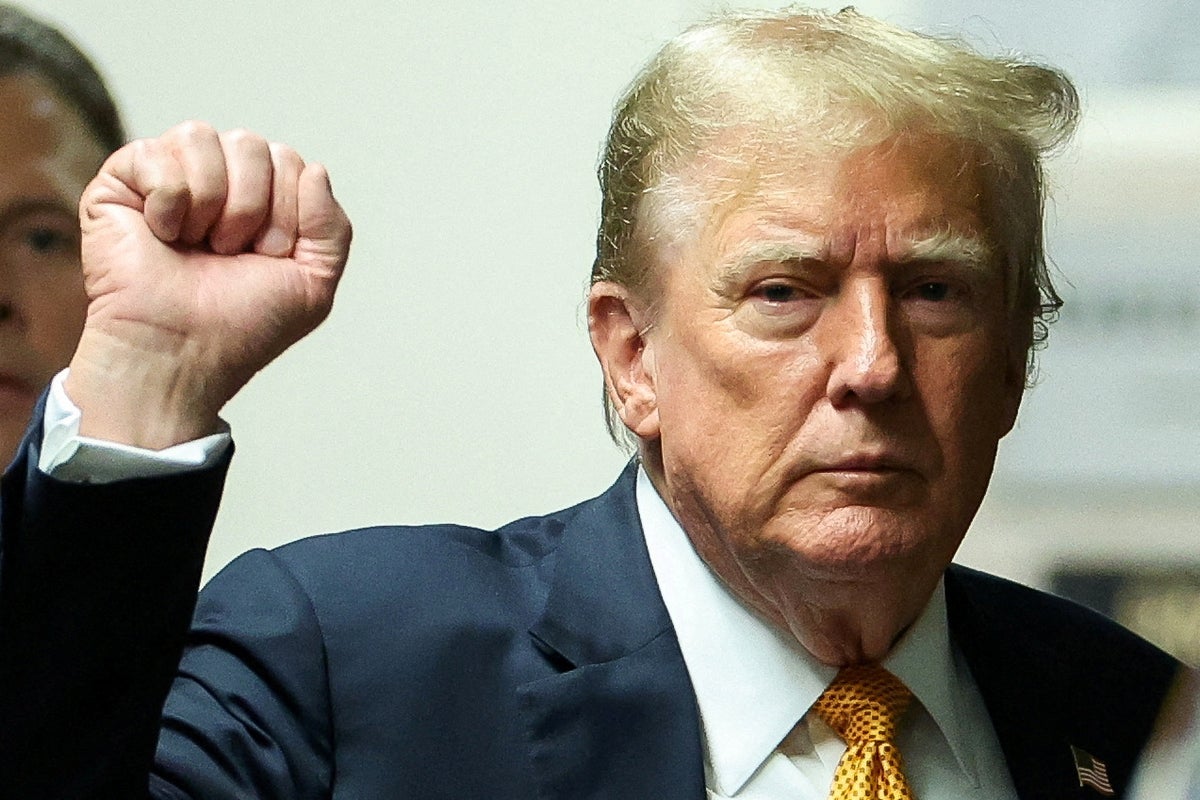
More than a year and a half after a 12-member jury found him guilty of falsifying business records as part of a scheme to unlawfully influence the 2016 presidential election, Donald Trump has formally called on a state appeals court to toss the verdict that made him the first-ever criminally convicted president.
In a midnight filing, attorneys for the president revived familiar arguments from Trump’s previous attempts to dismiss the case, which is still moving through state and federal courts as the president looks to the Supreme Court to vindicate him, once again.
“This case should never have seen the inside of a courtroom, let alone resulted in a conviction,” Trump’s six-person team of Sullivan & Cromwell attorneys wrote Monday.
Attorneys outlined five reasons why the case should be thrown out, arguing that Manhattan prosecutors “concocted” charges using a “convoluted legal theory,” then “fatally marred” the case with evidence that Trump claims is protected under the Supreme Court’s immunity ruling.
The office of New York District Attorney Alvin Bragg made a “mockery” of criminal law and relied on an “elaborate theory” to drum up charges against him, according to Trump’s attorneys.
Attorneys also argue in the 111-page document that the judge who presided over the case should have recused himself over his political contributions and “disqualifying family conflicts.”
Throughout Monday’s late-night filing, Trump’s legal team argues that the case was pursued only for political reasons in an attempt to derail his 2024 campaign, calling the case “the most politically charged prosecution in our Nation’s history.”
“Like every criminal defendant in a New York courtroom, President Trump was entitled to a fair trial before a properly instructed jury and a neutral judge. Instead, he was convicted after a trial that featured repeated and clear violations of his constitutional rights, federal law, and New York law, presided over by a judge who was required to recuse,” attorneys wrote.
The Independent has requested comment from Bragg’s office.
Jurors reached a 34-count guilty verdict against the president on May 30, 2024, following a weeks-long trial surrounding Trump’s efforts to pay off an adult film star to prevent her from speaking publicly about having sex with him.
Trump’s then-attorney Michael Cohen paid Stormy Daniels $130,000 for the rights to her story. Trump then reimbursed Cohen in a series of checks, some of which were cut from the White House.
Those reimbursements were falsely recorded in accounting records as “legal expenses,” fulfilling a conspiracy to unlawfully influence the 2016 presidential election, the jury found.
On January 10, Trump received a sentence of “conditional discharge” — which preserved the jury’s verdict but came with little, if any, criminal consequences. Trump was sworn into office a second time 10 days later.
Roughly one month after his conviction, the Supreme Court issued its “immunity” decision, throwing a wrench into the president’s federal criminal indictments and opening a door for his lawyers to question his conviction in New York.
Trump’s attorneys argue certain evidence — including Twitter posts and trial testimony from former White House aides about — should never have been shown to a jury under the Supreme Court’s immunity decision, which shields the president from criminal prosecution for “official” acts in office.
Those arguments were already rejected by Justice Juan Merchan, the Manhattan criminal court judge who presided over the trial, finding that the case involved Trump’s private conduct, not his official duties as president.
The president’s legal team also took aim at Merchan, who they say put the whole case in jeopardy by remaining on the bench throughout Trump’s trial. “His impartiality was reasonably in doubt” because he donated $35 to Democratic candidates or causes in 2020, and because his daughter worked for a digital ad agency that did work for Democratic officials, they argue.
The New York State Advisory Committee on Judicial Ethics had previously stated that there is “nothing in the inquiry to suggest that the outcome of the case could have any effect on the judge’s relative, the relative’s business, or any of their interests.”
Falsifying business records, on their own, are misdemeanor offenses. But Manhattan prosecutors elevated those charges to felonies by tying them to another crime – one that involves a conspiracy to manipulate an election through “unlawful means.”
Trump’s lawyers claimed that prosecutors – who argued that the president sought to unlawfully promote his 2016 campaign by burying allegations of his affairs from the public through business fraud — had “erred” by telling jurors that they did not have to unanimously agree what those “unlawful means” were.
Prosecutors also “had no proof” that Trump had “intent to defraud,” according to his lawyers.
State appellate judges are likely to take their time reaching a decision on what happens next in the president’s case.
But in June, his lawyers asked a federal appeals court to take up the case instead, which could give the president a shortcut to overturning his conviction at the Supreme Court. A ruling from the federal appeals court ruling is pending.
The nation’s high court had previously denied hearing Trump’s appeal in the hush money case, stating that the president should go through the normal course of appeals at the state level. That decision was narrowly decided by a 5-4 vote.
